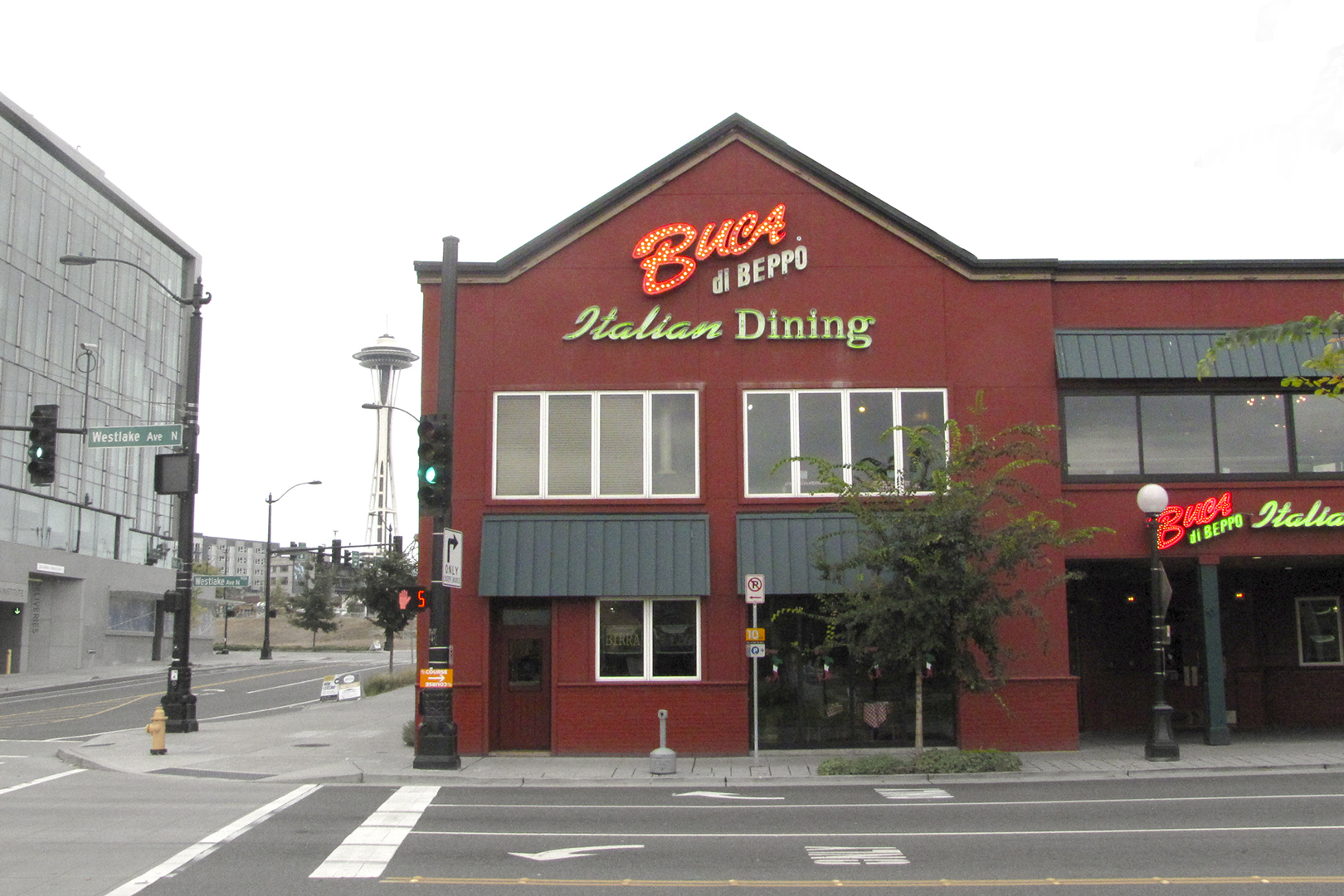Like the rain or a houseboat, the graffiti-soaked proposed-land-use placard has become an essential image in Seattle’s visual lexicon.
And here it is again, at the corner of Roy and Ninth, screwed on to a ratty single-story stretch of retail space, next to other signs warning off squatters. Below the blues and pinks of the tag, notice is given that the Department of Planning and Development is conducting an environmental review for a seven-story, 192,069-square-foot office building to be constructed on the lot. In an unnecessary detail, the placard notes that “existing structures [are] to be demolished.”
This is the end game for old South Lake Union. You can resist the rent hikes or the traffic snarls or the neighborhood’s intangible, mutating vibes. But when the building sells to a developer, one can do little but get out of the wrecking ball’s way. In this case it’s the developer to rule all developers, Vulcan, that’s doing the work, making way for more space in which Paul Allen’s Brain Institute may do its ground-breaking research. The teardown building and, more important, the land beneath it, sold for $35 million earlier this year; just 13 months prior it had been purchased for $10.5 million.
Another sign: this one informing would-be customers at the Ducati dealership that had been housed in the building that the business has relocated to 8100 Lake City Way. Yes, the ’burbs—or Maple Leaf, at least. That makes sense. Lots of parking for customers, more square footage for the bikes. South Lake Union? Let the brains have it.
All of which provides an interesting contrast to Ducati’s erstwhile neighbor, Buca di Beppo, which opened in SLU in 1996—a year before Amazon’s IPO—in the space directly next to Ducati. Let’s not mince words: In a city where chefs are locked in an open, dangerous arms race for preciousness, Buca di Beppo is a fat, saucy meatball down the front of our culinary scene’s white designer T-shirt. Where to begin with the gauche? First, it’s a chain—a chain owned by another chain, Planet Hollywood. Then there’s the paisan kitsch that serves as interior decoration, celebrating an American-Italian ethnic pride that’s more Dean Martin than Frank Sinatra. Nary an inch of wall space goes uncovered by framed black-and-white pieces of nostalgia. That style is common enough on America’s chain-restaurant scene, but Buca one-ups them all with the Pope Room, standard across all 92 locations in the world. Here, patrons are surrounded 360 degrees with photos of various Holinesses, with a heavy bias toward JP2. Lastly, there’s the menu, which provides family-style portions, meaning a “small” plate of pasta feeds three. And let’s not even get into the colossal brownie.
So to review: a proudly throwback restaurant that celebrates the Catholic Church and serves food meant for large families without aversion to carbohydrates sitting in the heart of techie, childless, agnostic Seattle. Forget that they’re sitting on a $30 million chunk of dirt; Buca just wasn’t designed for this. Hey, Ducati, save a space for Buca up there on Lake City Way, OK? But, prego, no.
“Not a chance!” says Bre Waters, senior divisional vice president for the restaurant, when asked whether the rising rents, building demolition, and parking pinches had them thinking about switching neighborhoods.
As things transpired, in mid-2015 Buca di Beppo moved just one block, one block closer to Amazon headquarters. Now on the corner of Westlake and Broad, Buca di Beppo sits next to two millennial-geared sports bars and a boat loan center.
The restaurant hasn’t been insulated from the changing neighborhood. Waters says that the customer base has shifted: “More corporate,” she says. “Amazon and Microsoft, Google and Facebook have changed our clientele from mostly tour and travel to a good mix of [tour and travel] and corporate.” And indeed, on a recent Wednesday afternoon, a seemingly endless stream of well-dressed young professionals streamed out of the Pope Room holding identical blue folders.
It’s an incongruous combination, but one that is clearly working for the chain.
“We’re different,” says Waters. “That’s what makes us special.”
dperson@seattleweekly.com









